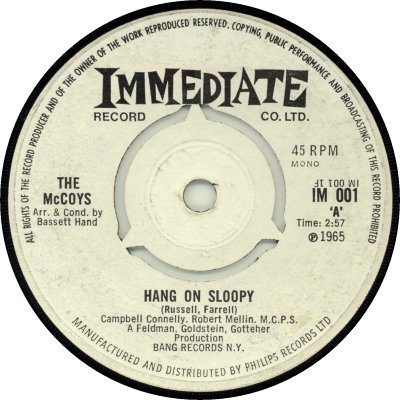
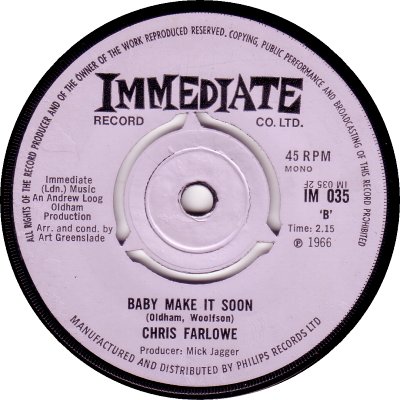
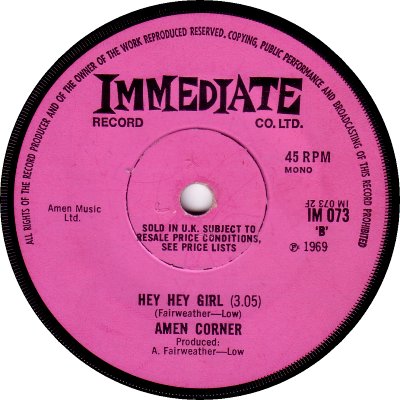
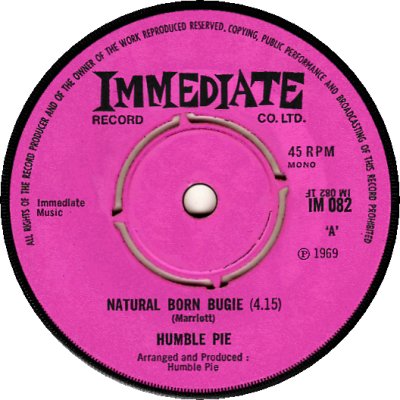
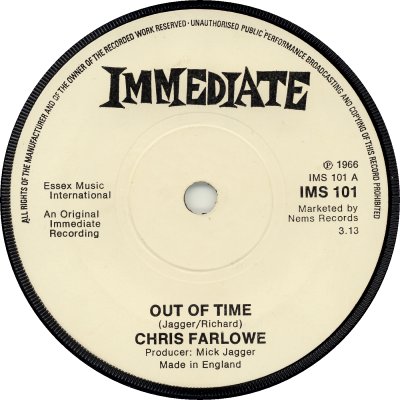
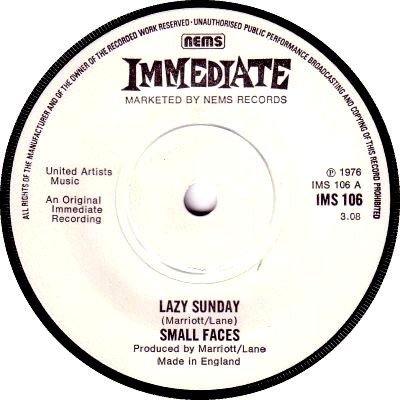
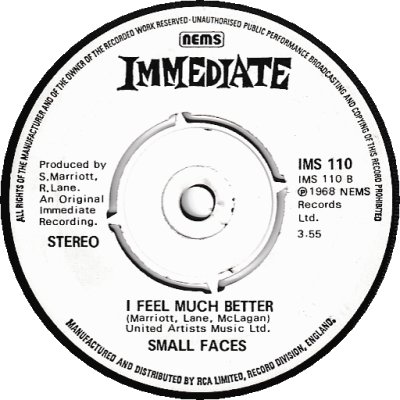
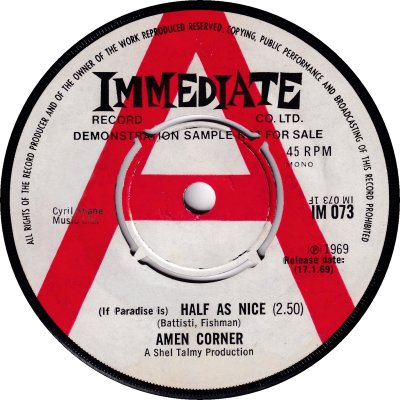
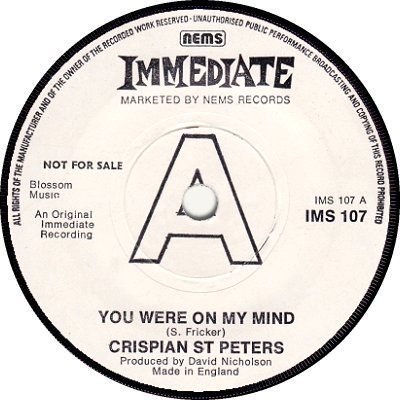
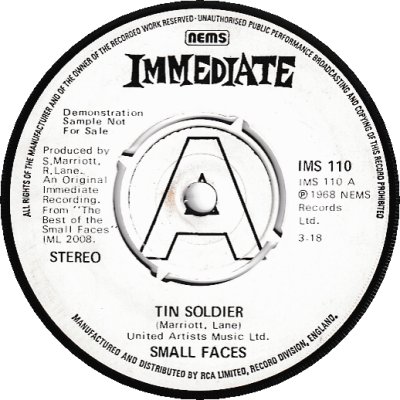
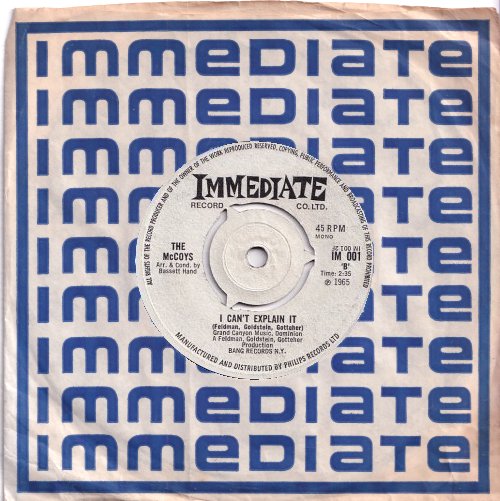
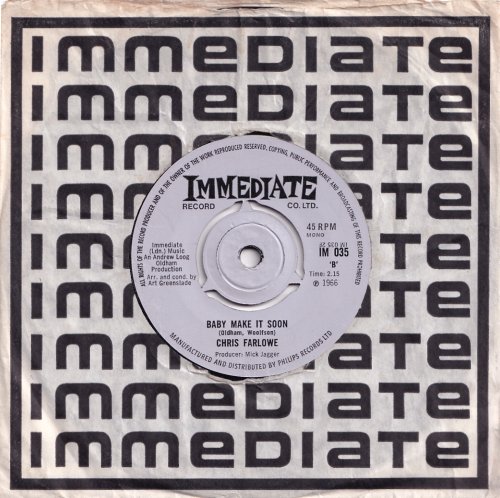
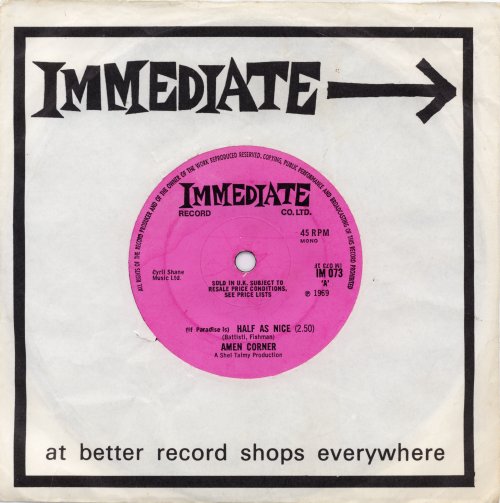
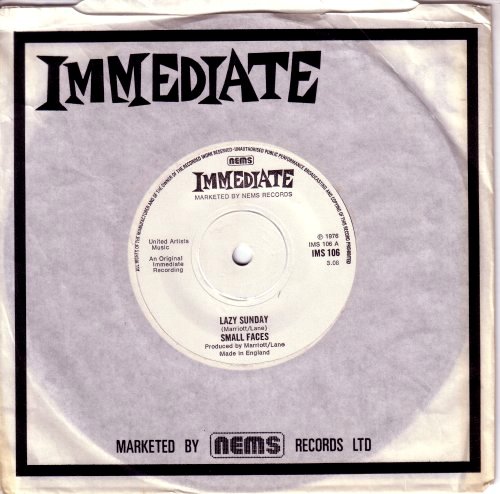
The real history of the Immediate label lies firmly in the 1960s, because, in its original form, the company started out in the middle of that decade - 1965 - and bit the dust at the end of it, going into voluntary liquidation in February 1970 ('Record Retailer' 28th February). It qualifies for a place on this list, however, because the NEMS record company acquired its catalogue in the '70s and reissued many of its products. It is an easy matter to tell these '70s reissues from the originals as they have 'MARKETED BY NEMS RECORDS' printed on both the label and the company sleeve.
Immediate was formed in 1965 by independent producer Andrew Loog Oldham and artist manager Tony Calder, and it initially arranged for its records to be pressed, promoted and distributed by Philips ('Billboard', 20th November 1965). It was given its first mention in 'Billboard' in the issue of the 28th of August of that year, which noted that the new company had secured rights to product on the American label Bang and said that a single by The McCoys, 'Hang On Sloopy' b/w 'I Can't Explain it', was to be the first to be released under the deal. Later, records licensed from other American companies, such as Jamie, Hercules and White Whale, also featured in Immediate's catalogues. That single duly appeared as the very first on Immediate, with the catalogue number IM-001, and it gave the company its first Chart success, reaching the No.5 position. Despite that promising start a run of non-hits followed, although the McCoys' follow-up, 'Fever' b/w 'Sorrow' (IM-021; 11/65) reached the comparatively disappointing No.44 spot and Chris Farlowe's 'Think' b/w 'Don't Just Look At Me' (IM-023; 1/66) squeaked into the Top 40. Things looked up when Twice As Much took 'Sittin' On A Fence' b/w 'Baby I Want You' (IM-033; 5/66) to No.25; and then Farlowe hit the top spot with 'Out Of Time' b/w 'Baby Make It Soon' (IM-035; 6/66). He went on to register other Chart placings, albeit lesser ones, and P.P. Arnold put Immediate back into the Top 20 with 'The First Cut Is The Deepest' b/w 'Speak To Me' (IM-047; 4/67). Matters went well enough for the company to be referred to as 'The best-selling teen-orientated indie in the U.K.' an a 'Billboard' article of the 11th of March 1967. According to the article Oldham and Calder were negotiating new deals for Immediate following an 'upsurge in the activities of their recording operation' - the company also covered artist management and record production. It added that Decca hit-makers Small Faces had been signed; the plan was for them to record for Immediate Productions which would lease the products to Decca. In the event the licensing didn't take place and the Small Faces records came out on Immediate. The band's singles provided Immediate with several more Chart successes.
The 'Billboard' article confirmed the news that had been broken by 'Record Retailer' the previous week (2nd March 1967): Immediate had broken off its marketing agreement with Philips and was negotiating a replacement pressing and distribution deal. 'RR' of the 9th of March was able to announce that the negotiations had been successful, and that Immediate had signed with EMI. 'Billboard' of the 23rd of September observed that, as well as Oldham himself, Mick Jagger, Mike Hurst, Steve Marriott and Ronnie Lane were producing records on the label. Hits continued to come, in amongst misses: in addition to those supplied by Small Faces, P.P. Arnold provided a couple more, and The Nice nearly got into the Top 20 with 'America' b/w 'The Diamond Hard Blue Apples Of The Moon' (IM-068; 6/68). Then Amen Corner put Immediate back at No.1 with 'Half As Nice' b/w 'Hey Hey Girl' (IM-073; 1/69). Fleetwood Mac almost repeated the trick a few months later, when 'Man Of The World' (IM-080; 3/69) reached No.2. Amen Corner's follow-up, 'Hello Susie' b/w 'Evil Man's Gonna Win' (IM-081; 6/69) went to No.4, as did 'Natural Born Bugie' b/w 'Wrist Job' by Humble Pie (IM-082; 8/69). Despite all this Chart action, however, all was not well at the company. 'RR' of the 21st of February reported that Andrew Oldham and Tony Calder had split up; Calder had sold his shares to Oldham and had resigned as a director with effect from the 31st of December 1969. The article observed that Immediate's agreement with EMI still had three months to run; but that turned out to be immaterial. The next issue of 'RR', that of the 28th of February, broke the news that the company had gone into voluntary liquidation. A month later 'RR' of the 28th of March put a figure to Immediate's debts: it was £265,000 in the red.
The next mention of Immediate in the U.K. Trade press came in 'Music Week' of the 8th of May 1975, which stated that Oldham was negotiating a deal with the American record company Sire for Immediate's back catalogue. It noted that the deal could lead to the reappearance of Immediate in Britain, but cautioned that the deal had yet to be confirmed. In the event Sire released albums of Immediate material by Small Faces and The Nice in the USA, but possession of Immediate's back-catalogue went to NEMS (q.v.). Having gained the material NEMS set about repackaging and reissuing it, on the Immediate label. The classic design was used, in white, but this time around singles were numbered in an IMS-100 series - it reached IMS-110, but IMSes 104 and 108 seem not to have been used and IMS-105, while listed in John Humphries's 'Music Master', appears doubtful; there are no pictures of it on the internet. 'MW' of the 20th of September 1975 announced that as part of a burst of activity by the NEMS group Immediate releases would be available through CBS, as indeed would those of its reborn parent label NEMS and sister-label Opal (q.v.). The company which actually handled the labels was in fact Anchor (q.v.), according to an advert in 'MW' of the 27th of September, but CBS took care of both manufacture and distribution, as it did for all of Anchor's associated labels. Immediate made one final move in the '70s: 'MW' of the 26th of March 1977 said that both it and NEMS had been licensed to RCA. At that point RCA naturally took over manufacture and distribution; as it happened, however, RCA issued only one Immediate single, the final one of the decade. For some reason Crispian St. Peters's 'You Were On My Mind' was among the Anchor-era releases: it had never been on Immediate before, but had been a hit on Decca. Perhaps NEMS acquired the rights to it and decided that an Immediate release was appropriate. The reissues were quite successful: three of them (Chris Farlowe's, 'Out Of Time', and two by the Small Faces) got back into the Top 50.
Immediate surfaced again in the 1980s, in a variety of forms. 'MW' of the 8th of May 1980 reported that the company's catalogue had been acquired from NEMS by Virgin; there were plans for the label to be reactivated and for it to feature reissues and compilations. The acquisition was via a licensing deal, and as a result of it a couple of singles by Rod Stewart and Small Faces appeared on a white Immediate label with a Virgin logo above the Immediate one. Their catalogue numbers were taken from Virgin's main VS-300 series. There were also three double-packs, by Chris Farlowe, Amen Corner and P.P. Arnold; these came out under the banner of 'The Immediate Catalogue' but hadn't Immediate labels, only Virgin and NEMS logos. Then in 1981 NEMS put out a pair of singles by Small Faces and Humble Pie on the Immediate label; these had the NEMS logo above the Immediate one and had 'Marketed by NEMS Records' underneath it, but they can be distinguished from the 1970s releases because they had catalogue numbers in an IMS-700 series. That wasn't the end. Between April 1982 and March 1983 NEMS issued a series of Immediate singles under their original 1960s catalogue numbers and with their original 'B' sides, this time in picture sleeves. Some have the NEMS logo above the label, others don't (IM-003 can be found in both forms); some have 'Issued under licence to Pablocrown Ltd' on the labels; but all can be distinguished from the originals at a glance because of their having a deep depression some 2" or so wide around the spindle hole. In addition there was a single by Chris Farlowe which wasn't the original pairing: this coupled 'Out Of Time' with 'My Way Of Giving', and it had its own discrete catalogue number, IMS-201. It had previously appeared as part of the 1970s reissue series, numbered IMS-101.
One basic label design served Immediate throughout, but there were a couple of variations in colour and there were a number of minor changes in the text. As stated above, manufacture and distribution were initially by Philips; there was a credit to that firm on the back of the company sleeve, and singles generally had the three-pronged centres characteristic of Philips and Polydor. Labels were white or shades of grey. The artist name started out at nine o'clock (1) and moved to six o'clock (2) in May 1966, with IM-033. EMI took over manufacture and distribution in March 1967, with IM-042 ('Billboard', 25th March); at that time the three-pronged centres became four-pronged or solid. November 1968 saw a change of colour to pink (3), IM-072 being the first release in the new colour. The 'Sold in the UK' text under the spindle disappeared in August 1969 with IM-082 (4); it is also lacking on re-pressings of IM-081. The '70s version of the label reverted to white. On the first single the reference to Nems was small and was placed under the catalogue number (5), but for the rest it got larger and migrated to below the 'Immediate' logo; these later records also gained a small NEMS logo on top of the Immediate one (6, 9). As a result of the move to RCA, IMS-110 has a reference to that company at 6 o'clock (7, 10). Re-pressings of IMS-109 also have the RCA reference.
With regard to demo copies, both Philips and EMI demos have a large red 'A' across the labels (8) and are very collectable - indeed all the non-hit Immediate singles from that period are sought-after. The '70s NEMS demos have a rather more discreet hollow 'A' in the centre (9, 10). As far as company sleeves are concerned, those from the Philips years have the company's name splashed across the front of them multiple times, in a font that doesn't match that of the logo on the label. The very first sleeve was blue-on-white (11); these seem to be fairly rare. The colour soon changed from blue to black (12). With the move to EMI the fronts of the sleeves were given much the same layout as that which had occupied the back of the Philips sleeves: a single logo - in the correct font - and an arrow, with a box enclosing the whole. In addition the text 'At better record shops everywhere' appeared on the bottom (13). Sleeves from the NEMS period were similar to the EMI ones but lost the arrow and had 'Marketed by NEMS' instead of the 'record shops' text (14). For the sake of clarity I've included the '80s reissues in the discography below, with the dates as given by 'Music Master' - frequently reissues from the '70s and '80s either had no year or the original 1960s year on them.
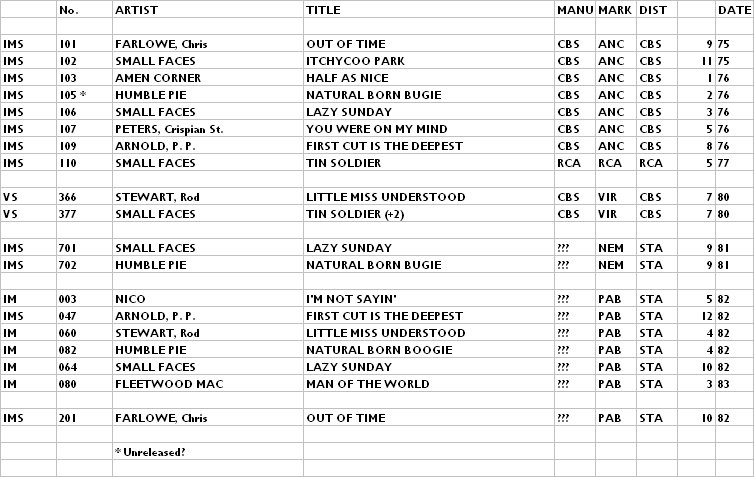


Copyright 2006 Robert Lyons.

